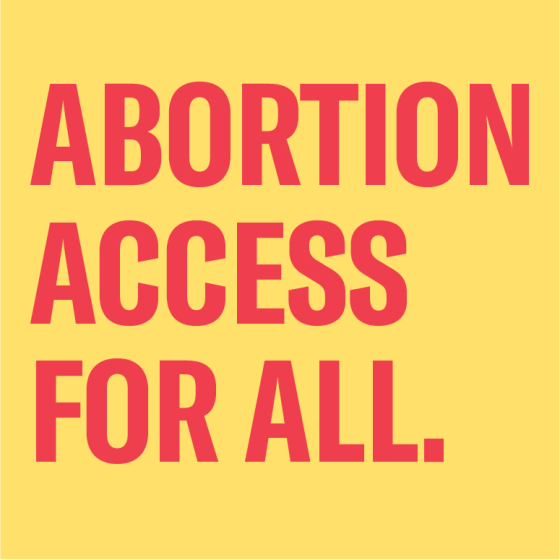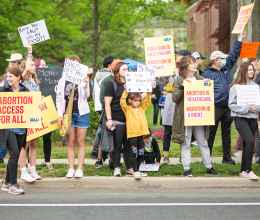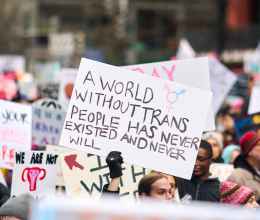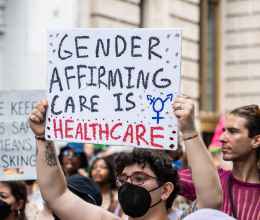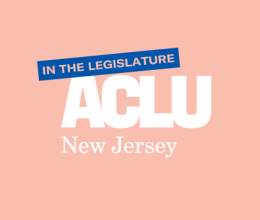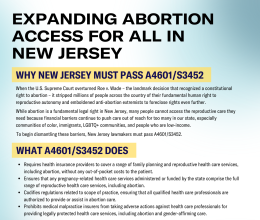When the U.S. Supreme Court issued its devasting ruling in Dobbs vs. Jackson Women’s Health, overturning Roe v. Wade and ending the federal right to abortion, anti-abortion politicians across the country seized their chance to enact and enforce policies decimating access to abortion and forcing people to remain pregnant against their will. In the year since this ruling, it has become clear that Dobbs was only the start of the ruthless attacks on reproductive rights.
In New Jersey, abortion is legal and the right to reproductive autonomy remains protected. In January 2022, before the overturning of Roe v. Wade, Governor Murphy signed into law the Freedom of Reproductive Choice Act, codifying the right to reproductive autonomy, including abortion, into state statue, and reinforcing state constitutional protections in New Jersey. Additionally, New Jersey has taken important steps to remove unnecessary and harmful regulations that affected access to abortion, expanded the scope of health care professionals who can provide abortion care, and enacted shield laws to protect abortion providers. While New Jersey’s strong legal protections to reproductive autonomy, including abortion, remain in place, legality does not ensure equitable access to this time-sensitive care. Many insurmountable barriers to accessing abortion remain, especially for people of color, immigrants, LGBTQ+ communities, young people, people who are low-income, and those living in rural areas.
One of the most restrictive barriers to abortion care is cost. The average cost of a first-trimester abortion in the United States is $550, and the costs increase drastically later in pregnancy. Data show that about half of adults in the U.S. can't afford an unexpected $500 health care bill. Though New Jersey allows Medicaid funds to cover abortions, many private insurance carriers will not cover abortion care, forcing patients to cover the entire amount themselves. Even New Jerseyans who have abortion covered in their insurance plan may be faced with high out-of-pocket insurance costs, co-insurance, and expensive deductibles that push abortion care out of reach.
Additionally, difficulties in finding a facility or clinic that provides abortion care can also impede access. Abortion facilities are closing at a concerning rate in New Jersey. Seven facilities closed between 2017 and 2021, leaving only 43 facilities to provide care for the nearly 2 million people who may seek care. As more facilities and clinics close, it is likely that the distance a patient must travel to access care will increase. Now that 33% of New Jersey counties do not have a clinic that provides abortion care, patients must travel greater distances to access the care they need while facing increased financial and logistical hurdles. New Jersey must increase support for and expand the number of facilities that provide abortion care so that patients can safely, easily, and affordably access the healthcare they need, whether they be from this state, or from one of the 13 states across the country that have banned abortion.
Ensuring that New Jersey prioritizes funding for abortion facilities and clinics is more crucial than ever, as attacks by anti-abortion extremists seeking to rescind approval for mifepristone, a safe and effective medication used for abortion and miscarriage management, will further restrict access to time-sensitive medication abortion across the country, disproportionally harming the communities most impacted by barriers to health care.
To begin dismantling these financial and logistical barriers, New Jersey lawmakers must take immediate action to expand access to abortion in our state by passing the Reproductive Equity Act (REA). The REA will:
- Mandate many private insurers to cover abortion care with no out-of-pocket costs to the patient.
- Establish a program to support the costs of abortion care for people who are uninsured or underinsured, including undocumented community members.
- Support existing abortion providers and take steps to expand the number of providers in the state.
- Codify regulations that authorize health care professionals in New Jersey to provide abortion care.
- Enact protections for providers and patients seeking abortion care.
At a time when millions of people across the country are being stripped of their fundamental human right to make decisions about their lives and bodies, New Jersey must be a leader in ensuring that the right to abortion care is accessible and equitable for all who need it. Anything less is unacceptable.

